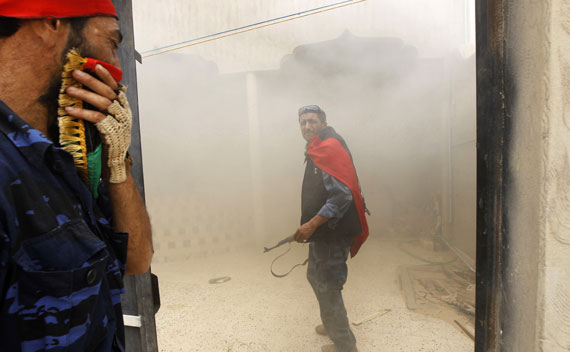The Consequences of Stalemate in Libya
More on:

In today’s Washington Post, columnist Anne Applebaum asks—though does not directly answer—the important question, “What to do About Libya’s Stalemate?” One position that she entertains is the notion that a stalemate is tolerable, and that “it might even work. A steady but relentless bombing campaign, generous humanitarian aid and training for the rebels, a bit of patience, and we’re done with Gaddafi without too much fuss or boots on the ground.”
Western (or certainly Arab League) political leaders might not discuss Libya often these days, but a stalemated civil war there is seriously problematic for five reasons:
First, people are dying and the situation could worsen. Before the civil war erupted, the chief prosecutor of the International Criminal Court, Luis Moreno-Ocampo, estimated that “500 to 700 persons had been killed in February alone when Libyan security forces had fired live ammunition.” Since then, deaths overwhelmingly committed by the regime have escalated though leveled off. A Libyan rebel spokesperson estimated two weeks ago that at least 15,000 people had been killed, but reports of civilian deaths at the hands of regime forces have all but disappeared. Given the motivations for revenge among both sides, however, the lull in violence directed at civilians could be short lived. As the UN’s International Commission of Inquiry on Libya concluded in its report last week, “The Commission reached the conclusion that crimes against humanity and war crimes have been committed by the Government forces of Libya,” and “did find some acts which would constitute war crimes” by opposition forces.
Second, one-sixth of the Libyan population of six million has been displaced. Approximately 920,000 expatriate workers in Libya were forced to return to their home countries, with some 250,000 having since returned. Sub-Saharan African workers have been targeted by rebel forces for arbitrary search and detention, as well as cruel and inhuman mistreatment. As the International Commission of Inquiry report revealed: “The most serious attacks on migrant workers appear to have been linked to a suspicion that such persons were ‘mercenaries’ on the basis of their national origin or skin color.” According to UNHCR, at least another 100,000 people are believed to be internally displaced, though few aid agencies have a good picture of the situation in the Nafusa Mountains.
Third, humanitarian assistance is needed. Applebaum identifies “generous humanitarian aid” as one precondition for stalemate giving way to success. However, the international community has not been generous so far. The UN issued its latest appeal for $407 million of critically needed humanitarian aid three weeks ago. As of today, all of the UN aid agencies in Libya have received less than half of the required funding in the form of either actual cash or pledges. In much of the eastern part of the country, the aid situation has stabilized and commercial markets are functioning. Nevertheless, as a UNHCR spokesperson stated today: “An aid crisis could be looming…It is apparent that the combined impact of protracted conflict and sanctions are eroding the government’s ability to effectively deliver assistance.” Fuel shortages are compounding the worsening humanitarian situation throughout the country. At one gas station in Tripoli, the lines stretched over five miles.
Fourth, most children are not attending school. The National Transitional Council (NTC) refuses to reopen schools. Education officials from the NTC have said that schools will only reopen once Qaddafi has fallen, the curriculum is rewritten, and teachers sympathetic to the regime have been purged. In the meantime, the NTC has put children to work “cleaning streets, working as traffic cops and dishing up army rations to rebel soldiers,” according to Dawn newspaper. Meanwhile, the UN’s International Commission of Inquiry reports that both government and opposition forces have used child soldiers in violation of international humanitarian law.
Finally, history and vast amounts of academic research demonstrate that the political upheaval caused by sustained civil wars decreases almost all socio-economic indicators, makes the eruption of post-conflict violence (including genocide and mass atrocities) much more likely, and often produces violence for export. On the latter point, some officials, such as Secretary of State Hillary Clinton, believe that Libya could become a breeding ground for Al Qaeda. As she testified before Congress in early March: “Many of the Al Qaeda activists in Afghanistan and later in Iraq came from Libya and came from eastern Libya, which is now the so-called free area of Libya… One of our biggest concerns is Libya descending into chaos and becoming a giant Somalia.” The possibility of Al Qaeda or its affiliates establishing a foothold in Libya has been overblown. (One of the NTC’s unbelievably one-sided public opinion polls asked “Does Al Qaeda play a role in the 17th February Revolution?” Allegedly, 94 percent of respondents said no.) Nevertheless, as the civil war stalemate persists, more and more young men learn the lethal tactics of warfare, forge ties with other fighters, and perhaps develop ambitions that can only be achieved through terrorism or violent goals beyond liberating Tripoli.
More on:
 Online Store
Online Store
